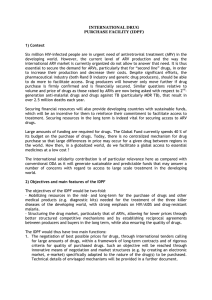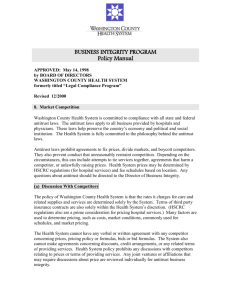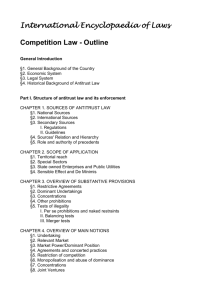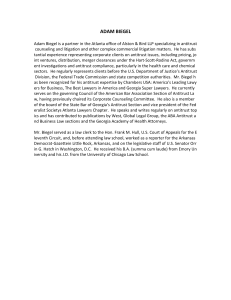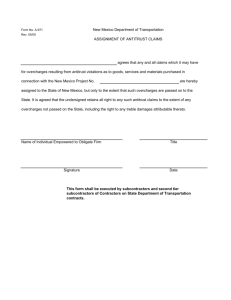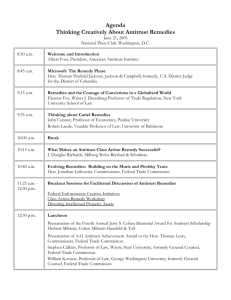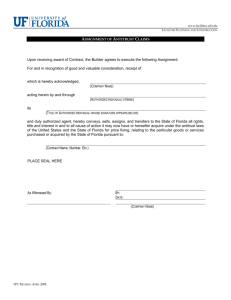OeBF Antitrust Policy and Guidelines
advertisement
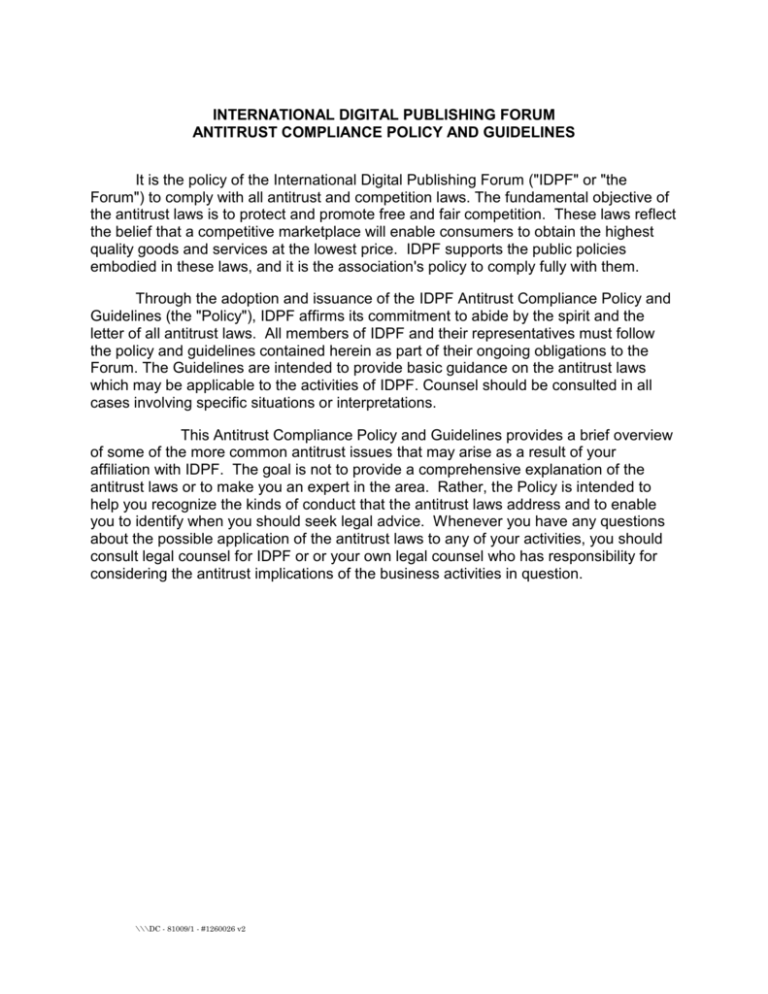
INTERNATIONAL DIGITAL PUBLISHING FORUM ANTITRUST COMPLIANCE POLICY AND GUIDELINES It is the policy of the International Digital Publishing Forum ("IDPF" or "the Forum") to comply with all antitrust and competition laws. The fundamental objective of the antitrust laws is to protect and promote free and fair competition. These laws reflect the belief that a competitive marketplace will enable consumers to obtain the highest quality goods and services at the lowest price. IDPF supports the public policies embodied in these laws, and it is the association's policy to comply fully with them. Through the adoption and issuance of the IDPF Antitrust Compliance Policy and Guidelines (the "Policy"), IDPF affirms its commitment to abide by the spirit and the letter of all antitrust laws. All members of IDPF and their representatives must follow the policy and guidelines contained herein as part of their ongoing obligations to the Forum. The Guidelines are intended to provide basic guidance on the antitrust laws which may be applicable to the activities of IDPF. Counsel should be consulted in all cases involving specific situations or interpretations. This Antitrust Compliance Policy and Guidelines provides a brief overview of some of the more common antitrust issues that may arise as a result of your affiliation with IDPF. The goal is not to provide a comprehensive explanation of the antitrust laws or to make you an expert in the area. Rather, the Policy is intended to help you recognize the kinds of conduct that the antitrust laws address and to enable you to identify when you should seek legal advice. Whenever you have any questions about the possible application of the antitrust laws to any of your activities, you should consult legal counsel for IDPF or or your own legal counsel who has responsibility for considering the antitrust implications of the business activities in question. \\\DC - 81009/1 - #1260026 v2 I. Overview of the Antitrust Laws The antitrust laws are based on the fundamental assumption that a competitive process will increase the supply and reduce the price of goods and services. These laws therefore prohibit conduct that will unreasonably restrain competition or restrict the freedom of action of businesses in their respective operations. The procompetitive purposes of standard-setting bodies have long been recognized. Still, because Forums such as IDPF gather competitors together, they are susceptible to certain antitrust pitfalls, and thus frequently are scrutinized by antitrust agencies. As such, IDPF must operate with heightened sensitivity to antitrust laws. Sherman Act, § 1. The most important antitrust law applicable to IDPF is Section 1 of the federal Sherman Act, which prohibits "[e]very contract, combination in the form of trust or otherwise, or conspiracy, in restraint of trade." Although this prohibition might seem to encompass almost every business transaction, the courts and antitrust agencies have interpreted it so that only restraints that are "unreasonable" are forbidden. Some agreements by competitors are deemed so harmful and facially unreasonable that they are considered per se illegal. This means that they cannot be justified by arguments about the reasonableness of the prices charged or the need to avoid chaos in the marketplace. These generally include agreements among competitors to fix prices, to reduce price competition by allocating customers, territories or markets, certain "tie-in" sales, and some forms of boycotts. The government may prosecute violations of Section 1 criminally or civilly. Violations of Section 1 are also frequently the subject of private civil damage suits. Section 5 of the Federal Trade Commission Act. Another law that frequently is applied to the conduct of trade associations and standard-setting bodies is Section 5 of the Federal Trade Commission Act. Section 5 prohibits "unfair methods of competition in or affecting commerce and unfair or deceptive acts or practices in or affecting commerce." The provisions of the FTC Act can be applied to a company acting alone (unlike Section 1 of the Sherman Act) and are written more broadly than the provision of the Sherman Act. State Laws. It is also important to recognize that state antitrust laws may be applicable to certain IDPF activities. These laws generally parallel the provisions of federal antitrust law. Because these Guidelines cannot catalog each state law, appropriate counsel should be consulted if any questions arise as to the propriety of actions conducted in a particular state. A. Agreements among Competitors ("Horizontal Agreements") What is an agreement? It is not necessary for an agreement to be formal or memorialized in writing for it to constitute an antitrust violation. A court may find there has been an illegal "agreement" under the antitrust laws even though there is no written contract, no "handshake," and no words that indicate an explicit agreement. An \\\DC - 81009/1 - #1260026 v2 agreement may include informal, unwritten, and even unspoken agreements or understandings. In addition, illegal agreements can be established by circumstantial evidence, such as a pattern of conduct or mere presence at a meeting at which illegal agreements were made. In fact, competitors may be accused of making illegal agreements even though there are no direct communications at all. If, for example, a price increase is announced well in advance of the effective date, it may sometimes be argued that the announcement was a “signal” to competitors that invited an agreement to take similar action. From a practical standpoint, IDPF members should focus their concern on the following antitrust violations that may arise pursuant to competitor agreements: Price Fixing. It is not always easy to recognize what is and what is not price fixing. Any agreement among competitors to raise, lower or stabilize prices is unlawful, even if the agreed-upon price is reasonable, and even if the agreement is never put into effect. Details like credit terms, discounts, and warranties are an element of price. Competitors may be charged with illegal price fixing if they discuss general pricing ranges or policies because these discussions may have an impact on actual price quotations. Market Allocation. Agreements among actual or potential competitors to allocate customer, territories, or lines of business also are usually serious antitrust violations because they reduce or eliminate price competition. Thus, it is illegal for two competitors to agree that one of them will not sell in a particular territory or to a particular customer that they both can presently serve. Similarly, it is unlawful for them to agree on the type of services or products that they will offer to customers. It may not be an illegal allocation, however, if these limitations are contained in intellectual property licensing agreements because such licensing arrangements may be more pro-competitive than an alternative scenario in which no licenses are granted at all. Similarly, allocation of customer, territory, or line of business responsibilities in connection with a joint venture among actual or potential competitors may also be permissible because that division of roles is reasonably necessary for the joint venture to achieve efficiencies or produce better products and services that benefit consumers. Legal advice is needed in these situations. Group Boycotts. A collective refusal by otherwise competing companies to deal with some third party, sometimes called a “group boycott,” raises serious antitrust concerns. It is dangerous for one company to agree with another company that neither one will do business with a particular supplier or customer, or that they will do business only with certain suppliers or customers or only on certain terms and conditions. -2\\\DC - 81009/1 - #1260026 v2 B. Agreements between Suppliers and Customers ("Vertical" Agreements) Agreements with suppliers and customers (other than those relating to resale prices) usually are legal unless some anticompetitive effect can be demonstrated. Moreover, these agreements can often be justified on the ground that they are reasonable. Such agreements are also far more likely to be embodied in specific written contracts, rather than inferred from discussions, so there is less risk that ambiguous conduct will be misunderstood. The following kinds of “vertical” agreements are most likely to raise legal questions, and therefore prior consultation with IDPF counsel or your counsel is essential. Exclusive dealing or requirements contracts. A contract may provide that one company will deal exclusively with a specific seller or buyer. These agreements may preclude the supplier’s competitors from participation in the business under contract. The legality of these arrangements depends on a variety of factors. In general, a contract for a short period of time, such as one year or less, does not raise antitrust concerns. Longer contracts may raise problems depending on the market shares involved and the business justification. Preferential treatment. The sale of the same goods to different customers at different prices raises a legal question, as do agreements to favor certain customers in promotional programs. There may be available justifications, but advice is required because there are a lot of technical distinctions. It is usually safe to enter into a “most-favored-nation” contract, which guarantees that no other customer will be treated more favorably than the contracting customer. On the other hand, there can be a problem if a contract guarantees that the contracting customer will get better treatment than anyone else. Tying arrangements and reciprocity. There may be a problem when a company attempts to extend whatever power it may possess in some segments of its business (the “tying” products) into other segments of its business (the “tied” products). On the other hand, it is not illegal to package the sale of goods or services at a particularly favorable price — so long as the customer has the realistic choice of purchasing the individual goods or services separately. Reciprocity differs from tying in that the seller of one product or service is the buyer of the other. The difference between illegal reciprocity and legal commercial relationships is difficult and legal advice is necessary. Resale price restrictions. Unlike other “vertical” contracts, agreements with customers on the prices that they will charge to their customers are almost invariably illegal. Even agreements which appear to place a ceiling on resale prices can raise serious antitrust questions. -3\\\DC - 81009/1 - #1260026 v2 II. Standards Setting The development of standards can promote competition and economic efficiency by disseminating product information and by eliminating unnecessary and confusing variations in products. As a result, joint standards development activity is normally subject to treatment under the antitrust laws that focuses on whether or not the activity is reasonably necessary to achieve legitimate procompetitive ends, and, if so, whether the benefits of the standard outweigh the costs. The benefits of standard setting are considerable, and the vast majority of standard development activities, when conducted properly, have little, if any antitrust risk. Antitrust problems can arise, however, in both the development of a standard as well as the enforcement of that standard. The legality of activities of IDPF and its members is determined by the application of the same legal standards used to determine the legality of activities of other groups of persons or firms. Special problems may arise, however, from the fact that a standard-setting Forum such as IDPF is, almost by definition, a combination of competitors or potential competitors. Antitrust problems may arise in several situations, such as in the following illustrative examples: When Forum members misuse the Forum to facilitate agreements that restrain trade such as when product standardization has the effect of stabilizing prices; When a Forum member fails to disclose intellectual property rights in the standards adopted and then seeks to assert its rights against those who adopt the standard; When a standards-setting organization adopts a specification that non-members are not able to meet, and that gives the members of the standards development group a competitive advantage in manufacturing or marketing; and When the Forum’s rules and procedures are used to unreasonably exclude some competitors. III. Antitrust Guidelines Any implication of collusion arising out of IDPF activities must be avoided at all costs. Some ways to do this are to avoid specific discussion of prices or any of the elements of pricing, such as pricing policies, discounts, warranties or guarantees, terms or condition of sale, credit, shipping, or commercial liabilities. Discussion of general elements of prices, such as saying that including something may be too expensive or that the benefits may outweigh the costs, is allowable. Above all, do not exclude or control competition. All parties have a right to be heard under the principle of openness. In order to minimize the antitrust risks associated with standards setting activities, the following guidelines should be followed regarding both the development and adoption of a standard as well as the promulgation of that standard: -4\\\DC - 81009/1 - #1260026 v2 1. Discussions in all IDPF related meetings, including Board and Working Group meetings, should relate solely to the legitimate purposes of IDPF. Care should be taken to avoid even the appearance of discussing competitively sensitive information, as such discussions may lead to the inference of an illegal agreement on prohibited topics. To this end, there should be no discussion, communication or other exchange between members of IDPF and/or their representatives regarding any of the following categories of information: Prices or pricing strategy. This requirement is to be interpreted broadly, to include, for example, current or projected prices; price levels; pricing procedures or formulas; price changes or differentials; markups; discounts; allowances; terms and conditions of sale, including credit terms, warranty provisions, etc.; or other information that might comprise an element of a product’s price, including profits, margins or cost data. Production levels, production capacity, or product inventories; Plans pertaining to the development, production, distribution, marketing, or introduction dates of particular products, including proposed marketing territories and potential customers; Terms on which any IDPF members will or will not deal with particular competitors, suppliers, distributors, or customers; Current or projected cost of procurement, development, or the manufacture of any product Allocation of customers, markets or territories. Non-public information regarding market shares. 2. All specifications and standards established by the IDPF shall be voluntary. Members should not discuss, exchange information, or enter into agreements that prohibit or restrict any member from establishing or deploying any other specifications. Members of IDPF will not be required to adopt any specification developed by the Forum. No efforts will be undertaken that are intended to prevent the manufacture, sale, or supply of any product or services not conforming to an adopted specification. 3. IDPF membership should be available to all interested hardware and software companies, publishers, authors and users of electronic books and related organizations on reasonable terms. No applicant for membership, who otherwise meets the qualifications set forth in the Bylaws of the IDPF, should be rejected for any anti-competitive purpose or solely for the purpose of denying such applicant the benefits of membership. -5\\\DC - 81009/1 - #1260026 v2 4. Interested parties who potentially may be affected by the adoption of a standard (including companies that do not belong to IDPF) shall be permitted [to comment on the development of any standards, through procedures established in IDPF's policies and procedures.] IDPF will endeavor to ensure that all potential competitors that may be affected by a proposed action be given the opportunity to participate in the development process. 5. All specifications should be based and selected on their quality, technological attributes and ability to address the need to establish the desired electronic book systems, applications and products that will benefit creators of content, makers of reading systems and consumers. 6. IDPF should limit its proposals and evaluations to matters that facilitate the quality development, production and adoption of electronic books and their interoperability with related systems. IDPF should not seek to promote standardization of sale, license or other commercial terms. 7. Special care should be taken to ensure that no IDPF meeting is used as a means of violating the terms of this Policy. Accordingly, the following practices should be followed: All meetings should follow a written agenda. If potential antitrust questions are raised by an agenda item, such item will be reviewed in advance by counsel. The Board Secretary should prepare minutes promptly after the meeting, summarizing all matters discussed. Only minutes approved by the Board and/or counsel should be distributed (even in preliminary form) and only minutes as approved need be retained. The purpose of this is to avoid the preservation of misstatements and ambiguities that may create misperceptions of the meeting. All Board minutes will be made available to IDPF Members on a timely basis. Informal meetings should not be held and informal discussions should comply with the standards of this Policy. 8. Members shall not discuss the degree to which members will or will not do business with firms that do not participate in IDPF. 9. Any information, materials, or reports of IDPF available for the use of its members should be made available to non-members on reasonable terms when non-availability of those materials imposes a significant economic disadvantage or cost to nonmembers that significantly limits their ability to compete against IDPF members. Once a specification is adopted, it should be made available to members and non-members on payment of reasonable fees. In addition, related manuals and services necessary to implement the specification should also be made available. -6\\\DC - 81009/1 - #1260026 v2 10. Each member, including any new member, of IDPF shall be supplied with a copy of IDPF's Antitrust Policy and Guidelines and must agree to abide by such Policy and Guidelines. IV. Conclusion As the foregoing discussion sets forth, activities of the IDPF will not include any actions that violate the law. The IDPF, in the course of its activities, shall not agree with, participate in, or give consideration to any activity, plan, understanding, agreement, or other arrangement that constitutes a violation of any federal or state antitrust laws, including but not limited to actions that would (a) raise or stabilize prices or fees, (b) boycott or refuse to do business with any third parties (other than through the IDPF's bona fide business contractual arrangements), (c) restrict or interfere with the exercise of free and independent judgment by the members in the management or operation of their respective business, or (d) obstruct or interfere with commerce or free and lawful competition. Members of the IDPFshall conduct all activities in compliance with the IDPF's Bylaws and this policy on compliance with the antitrust laws. You should consult with IDPF staff and/or legal counsel for IDPF when you are in doubt about the legality of any business activity. Even if the Antitrust Policy and Guidelines do not seem to apply literally, such consultation should occur whenever any proposed activity strikes you as "unfair," overreaching, or likely to be challenged by another party. Until you have received affirmative clearance for a proposed course of action that has raised doubts in your mind, do not do it. -7\\\DC - 81009/1 - #1260026 v2
